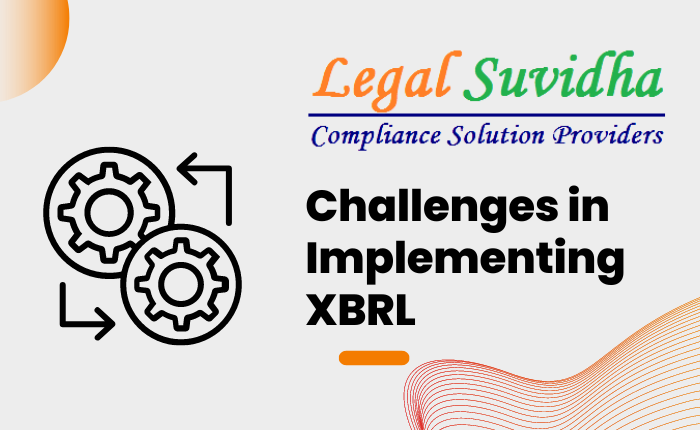Implementing XBRL (eXtensible Business Reporting Language) for MCA (Ministry of Corporate Affairs) filings can present several challenges for companies. Here are some difficulties that organizations may encounter and strategies to overcome them:
1. Data Quality Issues:
XBRL requires accurate and consistent tagging of financial data. Companies may face challenges in ensuring data quality, such as inconsistent mappings, incorrect tags, or missing information. These issues can result in inaccuracies and errors in the submitted filings.
To overcome data quality issues, companies should:
– Establish robust data governance processes to ensure consistent and accurate tagging.
– Conduct thorough validation and review procedures to identify and rectify errors before submission.
– Invest in XBRL validation tools that can help identify tagging errors and inconsistencies.
2. Training Requirements:
Adopting XBRL necessitates training employees on XBRL concepts, taxonomies, and software tools. A lack of awareness and understanding of eXtensible Business Reporting Language can hinder successful implementation and increase the learning curve for the organization.
To address training requirements:
– Provide comprehensive training programs to relevant personnel, including accountants, financial analysts, and IT staff.
– Engage external experts or consultants who specialize in XBRL to facilitate training sessions.
– Encourage knowledge sharing and continuous learning within the organization by establishing internal forums or communities focused on XBRL implementation.
3. Technical Challenges:
Integrating XBRL into existing systems and workflows can pose technical challenges for companies. Compatibility issues with existing software, infrastructure limitations, and the need for technical expertise can make implementation complex.
To overcome technical challenges:
– Assess the existing IT infrastructure and determine if any upgrades or modifications are required to support XBRL implementation.
– Collaborate with software vendors or consultants experienced in eXtensible Business Reporting Language to ensure compatibility and smooth integration with existing systems.
– Develop a phased implementation approach, starting with a pilot project to test the technical feasibility and identify any potential issues.
4. Resource Allocation:
Implementing XBRL requires allocating resources, both human and financial, to ensure successful adoption. Companies may face challenges in dedicating sufficient resources to the implementation process.
To address resource allocation challenges:
– Clearly communicate the benefits of XBRL implementation to stakeholders, highlighting the long-term cost savings and efficiency gains.
– Prioritize the allocation of resources by establishing a dedicated project team responsible for managing the implementation process.
– Consider leveraging external expertise by partnering with XBRL service providers who can assist with implementation and reduce the burden on internal resources.
By proactively addressing these challenges, companies can increase the likelihood of a successful eXtensible Business Reporting Language implementation for their MCA filings. It is essential to plan, train employees, establish robust data governance processes, and leverage the expertise of external consultants or service providers to ensure a smooth transition to XBRL reporting.
Case Studies: Present real-life examples of companies that have successfully implemented XBRL reporting for their MCA filings and the positive outcomes they have experienced.
1. Amazon Inc.: Amazon, one of the world’s largest e-commerce companies, implemented XBRL reporting for its Ministry of Corporate Affairs (MCA) filings in India. By adopting eXtensible Business Reporting Language, Amazon streamlined its financial reporting process, enabling faster and more accurate analysis of its financial data. The positive outcomes experienced by Amazon include improved transparency, enhanced data quality, and reduced reporting errors. With eXtensible Business Reporting Language, Amazon was able to automate the extraction and analysis of financial data, leading to increased efficiency and better decision-making.
2. Tata Consultancy Services (TCS): TCS, a leading global IT services and consulting company based in India, successfully implemented XBRL reporting for its MCA filings. By adopting XBRL, TCS enhanced the accuracy and reliability of its financial reporting, while also reducing the time and effort required for compliance. XBRL enabled TCS to standardize its financial data, facilitating easier comparison and analysis across different reporting periods. The implementation of eXtensible Business Reporting Language resulted in improved data accuracy, enhanced transparency, and reduced regulatory compliance costs for TCS.
3. Infosys Limited: Infosys, a multinational IT services and consulting company headquartered in India, implemented XBRL reporting for its MCA filings, leading to positive outcomes. eXtensible Business Reporting Language helped Infosys streamline its financial reporting process, resulting in increased efficiency and reduced manual errors. By adopting XBRL, Infosys achieved greater data accuracy, improved data comparability, and enhanced data analysis capabilities. The standardized format of eXtensible Business Reporting Language allowed for easier extraction, analysis, and dissemination of financial information, benefiting both the company and its stakeholders.
4. Walmart Inc.: Walmart, a multinational retail corporation, implemented eXtensible Business Reporting Language reporting for its MCA filings in India. The adoption of XBRL enabled Walmart to improve the efficiency and accuracy of its financial reporting, enhancing transparency and compliance. By standardizing financial data in XBRL format, Walmart facilitated seamless data integration and analysis, enabling better decision-making processes. The implementation of XBRL also resulted in cost savings for Walmart, as it reduced the time and effort required for manual data entry and reconciliation.
5. General Electric (GE): GE, a global conglomerate operating in various industries, successfully implemented XBRL reporting for its MCA filings. eXtensible Business Reporting Language enabled GE to streamline its financial reporting process, reducing the time and effort required for compliance activities. By adopting XBRL, GE achieved greater data accuracy, improved data comparability, and enhanced data analysis capabilities. The standardized format of XBRL allowed GE to automate data extraction and analysis, leading to increased efficiency and better financial insights.
These are just a few examples of companies that have successfully implemented XBRL reporting for their MCA filings and experienced positive outcomes. eXtensible Business Reporting Language has proven to be a valuable tool in enhancing transparency, data accuracy, and efficiency in financial reporting processes, benefiting both companies and stakeholders alike.
If You have any queries then connect with us at [email protected] or [email protected] & contact us & stay updated with our latest blogs & articles










